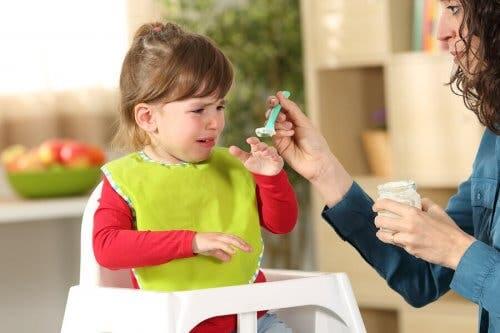Feeding Problems in Young Children
One of the most common feeding problems in young children is that they don’t eat. The good thing is that they can be solved by following a series of guidelines.

Feeding problems in young children are very common. Parents take their children to the pediatrician, complaining that they don’t want to eat. Furthermore, when they do, they feed reluctantly and protest and it seems that they aren’t growing enough.
Unlike feeding problems in older children and teens, in which there may be an alteration in the perception of body image, in young child, there’s a distortion while eating, which is strongly influenced by the child’s environment and the child’s own relationship with food.
How can feeding problems manifest in children?
Normally, feeding problems in young children manifest in the first six years of life and are more common in children under three. On many occasions, the difficulty appears during the transition from the bottle to a spoon or from crushed feeding to solid feeding.

An alteration in eating behaviors may manifest when the child’s goals of the act of eating (satiate their appetite, play with their caregiver, protest, attract attention to another problem, etc.) don’t coincide with those of their parents (finish the adequate portion, finish in the shortest possible time, interact with their child in a satisfactory way, educate, etc.).
If you don’t deal with this situation in an appropriate way, in the medium or long term, negative physical (nutritional) and psychological (affective) consequences may manifest.
What are these problems?
If a child refuses to adequately ingest foods, it can be due to various situations:
- Feeding difficulty. A general concept to refer to any problem related to feeding in the child, from the false perception on the part of the parents that there’s inadequate intake, to real eating behavior disorders.
- Neophobia. This is very common in early childhood. It consists of a child’s refusal to try new foods. It isn’t a pathology in itself and isn’t always accompanied by nutritional consequences or affective disorders.
- Eating disorders in young children. An important enough feeding problem to produce a nutritional or socio-emotional disorder in the child, which also affects their caregivers and requires specific treatment.
In general, these are “minor” problems, such as a misinterpretation by parents or minor feeding difficulties. Nevertheless, sometimes, it can be a real eating disorder, as this study published in the International Journal of Eating Disorders shows.

Tips to get your child to eat
- Respect their pace of development and allow some autonomy, according to their abilities. Tolerating a certain age-appropriate disorder (for example, not disturbing your child by cleaning them after each bite).
- Don’t interpret the initial rejection of new foods as permanent. Continue offering the food in the following days or weeks without pressuring them (it may take up to 10 or 15 times for your child to accept it). Gradual and regular exposure to food favors children’s tolerance and acceptance in the short and long term.
- Don’t preset an amount of food that they “have to eat.” The child decides how much they eat. Forcing your child to eat increases family dissatisfaction and the risk of food-related problems.
- Establishing routines can help. For example, eating in a quiet place without any distractions (television, mobile phones, computers, etc.) or having a meal schedule.
- When faced with negative situations (your child doesn’t eat, doesn’t like foods, or misbehaves), maintain a neutral attitude. Avoid getting angry or showing anger.
More tips to get your child to eat
- Enjoy eating meals as a family, reinforcing achievements. Experts consider that eating together as a family is a prevention factor for certain health, eating, conduct, and behavior disorders.
- Don’t use food as punishments or rewards or as consolation or blackmail.
- Allow the child to manipulate food. Young children learn through touch and smell… and food is no exception! Therefore, it’s advisable to let your child experiment foods with their senses.
- Don’t offer the child different foods from the menu. It’s easy to make the mistake of giving the child other foods than those intended for them to eat. But, in the long run, the consequences of this are that the child is the one who decides what they eat, rather than following a balanced diet with a variety of foods.
To make sure your child doesn’t suffer from feeding problems, take them to their pediatrician for a checkup.
